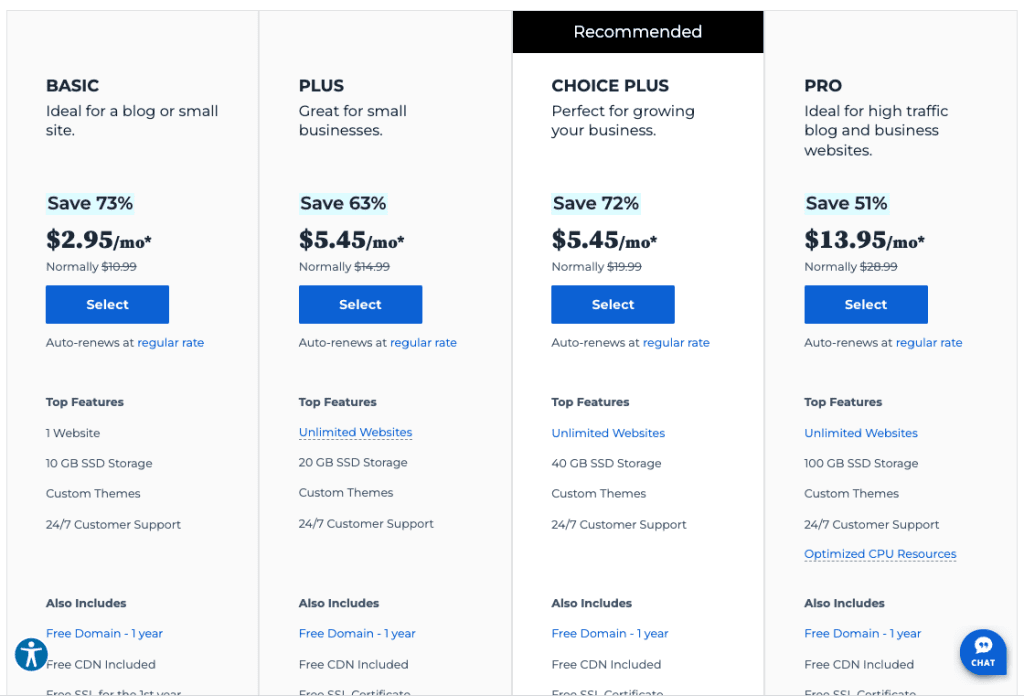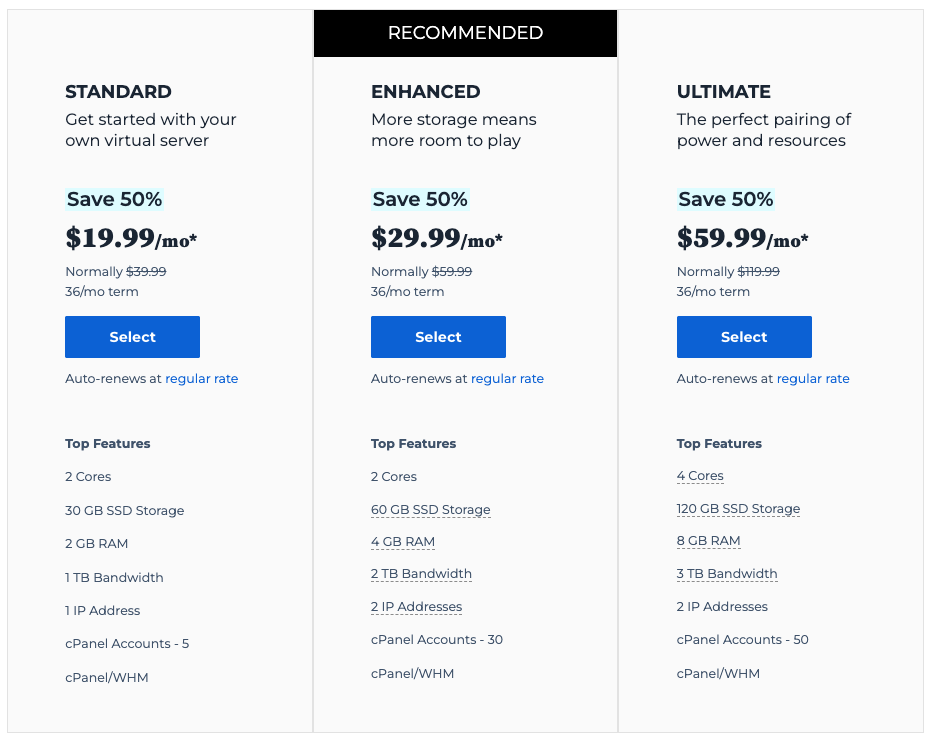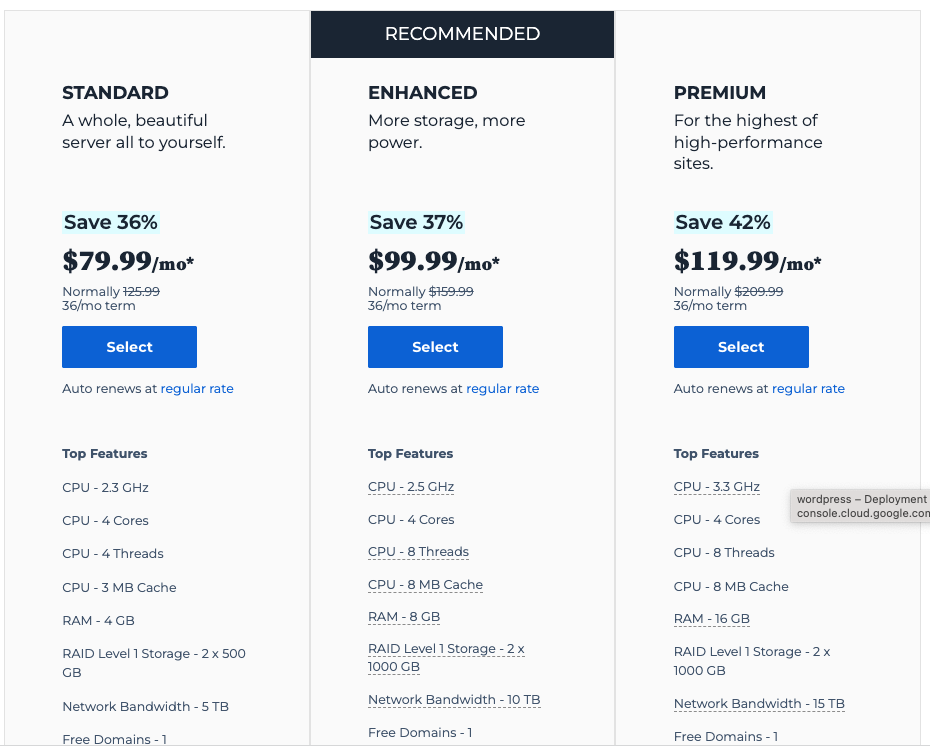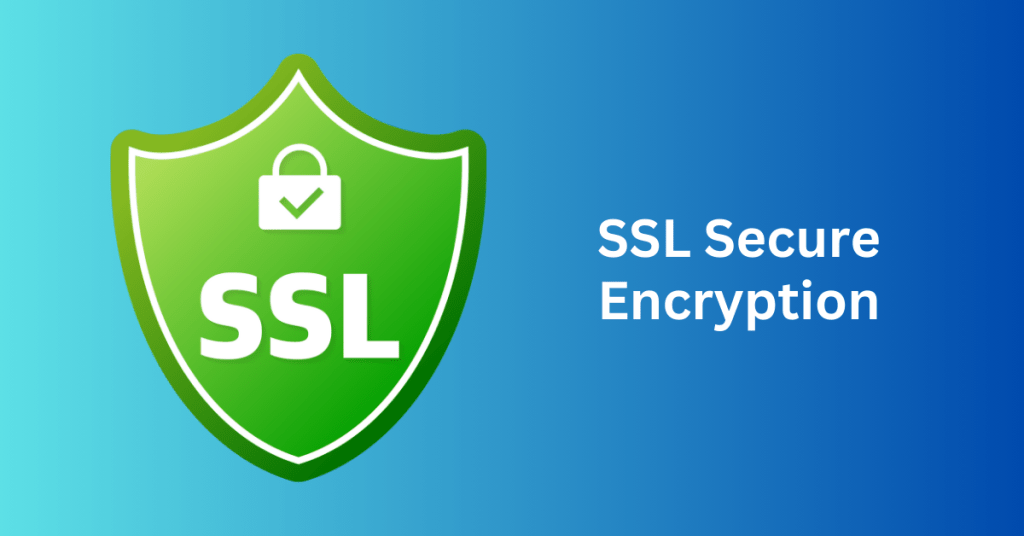Curious about the cost of hosting a website? Buckle up, because knowing web hosting costs is key to budget optimization, and it impacts more than just your wallet.
Your hosting choice can determine whether your website operates smoothly or encounters significant hurdles. The provider you choose can either streamline the process of building your online presence or make it needlessly challenging.
This guide will walk you through various types of hosting and their typical costs, alongside common additional expenses. You’ll also discover how to select the best web hosting provider for your specific needs and brand.
What is Web Hosting?

Web hosting is a fundamental service that allows website owners to make their websites accessible on the Internet. When you build a website, you need a place to store all its files, data, and content. Web hosting provides this storage space on servers. Powerful computers that are specially designed to host websites and serve their content to users when they access the site through a web browser.
Essentially, web hosting works by storing your website’s files on a server connected to the internet. This server is maintained and managed by a web hosting provider. They will ensure that your website is up and running smoothly 24/7. When someone types in your website’s domain name (e.g., www.bennietay.com) in their browser, the browser sends a request to the server hosting your website. The server then retrieves the necessary files and delivers them to the visitor’s browser, allowing them to view your website.
Web hosting services vary in terms of features, performance, and cost. Shared hosting is a common and affordable option where multiple websites are hosted on the same server, sharing their resources. This can be suitable for small websites or blogs with moderate traffic. On the other hand, dedicated hosting provides an entire server dedicated solely to one website. It offers greater control, flexibility, and performance. This is ideal for large websites with high traffic volumes or specific customization needs.
Beyond basic storage and server resources, web hosting providers often offer additional features such as domain registration, email hosting, security measures like SSL certificates, regular backups, and technical support. These services are essential for maintaining a reliable and secure online presence.
Free Hosting vs. Paid Hosting

While free hosting might seem appealing, it’s important to be aware of several significant downsides. And this might impact your website’s performance and user experience.
Firstly, free hosting providers often place advertisements on your website to cover the costs of their services. These ads can be intrusive, distracting visitors from your content and slowing down page loading times. Hence, resulting in a poorer user experience overall.
Additionally, free hosting typically comes with limitations on storage, bandwidth, CPU usage, and other essential computing resources. This can be problematic during periods of high traffic. Hence, causing your website to load slowly or even crash.
In contrast, opting for paid website hosting is generally a more reliable and effective option. Reputable paid hosting services offer robust security measures like firewalls and DDoS protection. This can ensure the safety and integrity of your website.
Besides, paid hosting also provides higher uptime guarantees and 24/7 customer support through various communication channels. This is crucial for resolving issues promptly and minimizing downtime.
Furthermore, paid hosting plans often include valuable add-ons such as content delivery networks (CDNs), SSD storage, and caching mechanisms. These can significantly enhance your website’s performance and speed.
With paid hosting, you also have the flexibility to personalize server settings and install preferred software. This will offer extensive customization options that are not typically available with free hosting services.
Ultimately, investing in a paid web hosting plan is advisable unless you are launching a small, short-term project or personal website. It’s important to note that paid plans can be affordable. This is especially true when considering the long-term benefits and enhanced features they offer.
Factors Affecting Web Hosting Cost

To grasp website hosting costs, it’s crucial to delve into the underlying factors that influence these expenses. This guide will explore each of these factors to equip you with a comprehensive understanding.
1. Web Hosting Type
Firstly, the type of web hosting you choose significantly impacts the cost. Different hosting types, such as shared hosting, VPS (Virtual Private Server) hosting, dedicated hosting, and cloud hosting, vary in price based on the resources and level of control they offer.
In the next section, we’ll explore the typical expenses associated with each hosting type. This will help you determine which best fits your needs and budget.
2. Scalability
Scalability is another crucial factor affecting hosting costs. As your website grows in traffic and complexity, you’ll likely need to upgrade your hosting package to accommodate increased demands for resources like storage, bandwidth, and processing power.
Hence, it’s important to select a hosting provider that offers scalable options and makes it seamless to upgrade your plan as your website grows.
3. Renewal Fee
Renewal fees can catch many website owners off guard. Initial promotional rates often lure customers in, but once the initial contract period ends, renewal costs can be significantly higher. To mitigate this, consider opting for longer contract terms at the introductory rate to lock in savings for an extended period.
Furthermore, the features included in your hosting plan can impact its overall cost. While many providers bundle features like backups, email services, page builders, and DNS management into their plans, some may charge extra for certain premium features.
You should always prioritize hosting providers that offer valuable features as part of their standard packages to maximize the value you get for your investment.
3. Contract Length
Lastly, the length of your hosting contract can affect pricing. Many hosting companies offer discounted rates when you commit to longer contract periods upfront. For instance, opting for a 36-month plan instead of a monthly plan for Bluehost yields greater savings per month.
Understanding these nuances will empower you to make cost-effective decisions when selecting a hosting provider that aligns with your website’s present needs and future growth aspirations.
Different Web Hosting Types and Costs
Exploring the various web hosting types is essential as it significantly impacts your hosting costs. Let’s dive into each type in detail to understand their features and cost implications.
Shared Hosting
If your primary concern is affordability, shared hosting emerges as a compelling option to consider. This hosting type involves renting server space alongside other clients. It means multiple websites sharing the same CPU cores, RAM, and disk space on a single server. This shared configuration contributes to a lower price point compared to dedicated or VPS hosting solutions. This makes it like renting a house with roommates to reduce individual expenses.

However, the affordability of shared hosting comes with certain trade-offs. Because you don’t control the server’s configurations, there are limitations to what you can modify for your website’s specific needs. Additionally, the performance of your website can be affected by the activity of other websites on the same server. If another site experiences a sudden surge in computing demands, it may temporarily impact the performance of your site.
The best use cases for shared hosting typically revolve around personal blogs, smaller online stores, or new brands with relatively low levels of website traffic. These scenarios benefit from the cost-effectiveness of shared hosting without requiring extensive server resources or advanced customization.
In terms of cost, shared web hosting can be incredibly budget-friendly. The price can start as low as $2 per month through providers like Bluehost. This entry-level pricing makes shared hosting accessible to individuals and small businesses seeking to establish an online presence without significant upfront investment. This aligns well with affordability as a primary consideration.

Virtual private server (VPS) Hosting
VPS (Virtual Private Server) hosting offers a significant step up from shared hosting by providing you with dedicated virtualized resources on a physical server that’s partitioned using a hypervisor. Each customer is allocated their own portion of resources, including CPU cores, RAM, and disk space. This can ensure that their website’s performance remains stable and unaffected by the activities of other users on the same server. Besides, this guarantee of dedicated resources elevates VPS hosting above shared hosting in terms of reliability and performance consistency.
One of the key advantages of VPS hosting is the level of control it affords users. With VPS plans, clients often have root access, granting them extensive control over software installations, server configurations, and other aspects of the virtual server environment. This enhanced control is particularly beneficial for users with technical knowledge or specific customization requirements. This will allow them to optimize their server setup to suit their website’s unique needs.
On the other hand, VPS hosting is ideal for growing websites that have outgrown the limitations of shared hosting packages. As websites experience increased traffic and resource demands, VPS hosting provides scalability and flexibility to accommodate growth effectively. It serves as a bridge between shared hosting and dedicated hosting, offering a balance of performance, control, and affordability.
In terms of pricing, VPS hosting typically starts at around $10 per month. This makes it a cost-effective solution for websites that require more robust resources and customization capabilities than shared hosting can provide.

Dedicated Hosting
Dedicated hosting represents the pinnacle of hosting solutions. This is where an entire physical server is exclusively dedicated to a single client’s use. This means that all the hardware resources of the server—CPU, RAM, storage—are entirely at your disposal. This provides unparalleled performance, customization options, and security benefits. With dedicated hosting, you have the freedom to install any software, choose your preferred operating system, and implement custom security measures such as your preferred intrusion prevention system, granting full control over the server environment.
The complete control offered by dedicated hosting is ideal for businesses and organizations with sophisticated IT needs and high-traffic websites. Since clients have exclusive access to the server, they can optimize the server configuration to meet specific requirements. This can ensure optimal performance and security tailored to their unique needs. However, this level of control and performance comes at a higher cost compared to shared hosting and VPS hosting. This is primarily due to the dedicated nature of the resources provided.
However, it’s important to note that managing a dedicated server requires technical expertise and resources. Clients either need an in-house technical team proficient in server management or may opt for managed dedicated hosting plans that include server management services provided by the hosting provider. Managed plans can simplify server maintenance, security updates, and technical support. This will make dedicated hosting more accessible to organizations without extensive IT resources.
Dedicated hosting is best suited for mission-critical applications, high-traffic e-commerce websites, large enterprises, and organizations with complex IT infrastructure requirements. While the starting price for dedicated hosting typically begins around $100 per month, the cost can vary based on factors such as server specifications, additional services, and service level agreements (SLAs) offered by the hosting provider.

Cloud Hosting
Cloud hosting offers a dynamic and reliable solution for website hosting by utilizing a network of interconnected servers. One of the primary advantages of cloud hosting is its inherent reliability. If one server within the cloud network experiences an issue or goes offline, other servers automatically step in to ensure continuous uptime and availability of your website. This redundancy enhances reliability and minimizes the risk of downtime due to hardware failures or maintenance.
Besides, scalability is another key benefit of cloud hosting. Website owners can adjust computing resources—such as CPU, RAM, and disk space—based on fluctuating demands. For example, during peak periods like holiday seasons or promotional events, resources can be scaled up to accommodate increased traffic and workload. Conversely, during quieter periods, resources can be scaled down to optimize costs, providing flexibility and cost-efficiency.
On the other hand, security concerns around cloud hosting are common, especially regarding the storage of sensitive data. However, cloud hosting platforms offer robust security measures, including role-based access control, encryption, and comprehensive compliance frameworks. These security features empower website owners to implement stringent security practices to protect their data and ensure regulatory compliance.
Cloud hosting is well-suited for websites of all sizes, particularly those that require flexible resource allocation and continuous availability. Whether you’re running a small business website, an e-commerce platform, or a large enterprise application, cloud hosting provides scalability and reliability to meet varying demands and growth trajectories effectively.
In terms of cost, cloud hosting typically operates on a pay-as-you-go pricing model. Clients are billed based on the resources they consume, such as compute instances, storage usage, and data transfer. This cost-effective approach allows businesses to align their hosting expenses with actual usage, optimizing resource allocation and budget management.

Other Web Hosting Costs
Besides hosting, there are other costs involved when building a website. Let’s have a look at other costs that might be incurred.
Domain name
Securing a domain name is an essential step in establishing your presence on the internet. A domain name serves as the unique address that users type into their web browsers to access your website. For example, the domain name for this website is bennietay.com. When choosing a domain name, you’ll need to consider the top-level domain (TLD) extension, such as .com, .net, or .org.

To acquire a domain name, you can purchase it from a domain registrar or a hosting provider like Bluehost. However, many hosting providers do offer a free domain name for the first year with their hosting packages. It comes along with additional services like domain name privacy and automatic renewals to simplify the management of your domain.
Domain name prices vary depending on factors such as the popularity of the TLD and the registrar you choose. Typically, new domain registrations range from $10 to $20 per year, with potential increases in renewal fees after the initial registration period.
In addition to serving as a website address, your domain name can also be used to create custom email accounts. This personalized email setup adds a professional touch to your online presence and enhances your brand identity. Many hosting providers offer email hosting services along with domain registration, making it convenient to manage both your website and email accounts under one platform. By leveraging your domain name for email, you can establish credibility and strengthen communication with your customers.
Email Hosting
Having a custom email address associated with your domain name is crucial for building trust and credibility with users. Unlike generic email addresses from free providers like Gmail or Yahoo, a custom email address that matches your domain (e.g., yourname@yourdomain.com) exudes professionalism and reinforces your brand identity.
While many web hosting providers include email hosting as part of their hosting plans, some may offer it as an additional service for an extra cost. If your current hosting plan does not include email hosting, you have the option to explore standalone email hosting solutions. For example, Google Workspace (formerly G Suite) is a popular choice for professional email hosting and collaboration tools. It charges around $6 per user per month for its basic plan.
However, certain hosting providers like Bluehost offer special discounts and integrated solutions for email hosting. Bluehost clients can benefit from discounted rates on Google Workspace subscriptions, sometimes at half the standard price. This makes it more affordable and convenient for website owners to set up and manage professional email accounts alongside their domain hosting.
SSL certificate
SSL (Secure Sockets Layer) certificates are a crucial component of website hosting that ensures the security and confidentiality of data transmitted between a web server and a user’s browser. When you install an SSL certificate, it encrypts the connection, preventing hackers from intercepting or eavesdropping on sensitive information such as financial details, login credentials, or personal data.

If your website collects or processes any form of sensitive information from users, such as credit card numbers, passwords, or personal contact details, installing an SSL certificate is essential for safeguarding this data. Beyond security benefits, SSL certificates also contribute to improving your website’s search engine ranking, as major search engines like Google prioritize websites with HTTPS (secure) connections in their search results.
The cost of SSL certificates varies based on factors such as the type of certificate and the level of validation required. The most common and affordable type is the single-domain SSL certificate, which typically costs around $8 per year. However, there are also more advanced SSL certificates available, such as wildcard certificates (covering all subdomains of a domain) and extended validation (EV) certificates, which offer higher levels of security and validation at higher costs.
Many reputable web hosting providers offer free SSL certificates as part of their hosting packages. For instance, Bluehost provides free SSL certificates that can be easily activated for all domain names hosted on their platform. This bundled SSL offering not only saves costs but also simplifies the process of securing your website with HTTPS encryption, enhancing both security and trust for your visitors.
Marketing
Once your website is created, the next crucial step is to effectively connect with your target audience, increase brand awareness, and convert leads into paying customers through strategic marketing efforts. Various marketing tactics such as pay-per-click (PPC) advertising, search engine optimization (SEO), content marketing, and email outreach play important roles in growing your business online.

PPC advertising allows you to display ads on search engines or other platforms and pay only when users click on your ad, making it a cost-effective way to drive targeted traffic to your website. SEO on the other hand, focuses on optimizing your website’s content and structure to rank higher in organic search results, improving visibility and driving organic traffic over time.
Besides, content marketing involves creating valuable and engaging content that resonates with your audience, establishing thought leadership and attracting potential customers. Email outreach helps nurture relationships with prospects and existing customers through personalized email campaigns.
The amount you invest in marketing depends on your goals, budget, and preferred approach. There are various strategies to consider, from free marketing tactics like organic social media engagement and SEO to pay-as-you-go methods like PPC advertising and sponsored content, as well as fully budgeted marketing campaigns that encompass multiple channels and strategies.
How To Choose A Web Hosting Provider and Plan
By following this approach, you’ll not only select the ideal web host but also maximize your savings. Let’s break down each step in detail because the choice of web host and hosting plan will greatly influence your overall expenditure.
Research For Best Web Hosting Providers
Starting on a quest to discover the ideal web hosting provider involves a strategic approach that goes beyond mere surface evaluations. Begin by getting into comprehensive reviews from reputable sources like Trustpilot, which provide valuable insights into user experiences and service quality.
Additionally, you may tap into your network for firsthand recommendations, as peers often offer valuable perspectives based on their hosting journeys.
Thoroughly Evaluating Hosting Providers
Then, conduct a vetting process to pinpoint a hosting provider that aligns perfectly with your specific web hosting requisites and financial parameters. You should compile a concise list of potential hosts and delve deep into their respective feature sets. In addition, you need to emphasize providers that offer round-the-clock technical support. This is a vital lifeline to swiftly resolve issues and minimize downtime during critical situations.
Besides, ensure that the chosen provider offers diverse communication channels for customer support, including phone, email, and live chat, to cater to various preferences and urgent needs.
Selecting Features Wisely
Carefully scrutinize hosting packages until you grasp precisely which features are indispensable for your website. You need to understand the impact of add-on features such as automatic backups, SSL certificates, content management systems (CMS), content delivery networks (CDNs), and branded email accounts on hosting costs. Some providers include these features in their plans at no additional charge, effectively optimizing value for your investment.
For specialized needs, consider tailored solutions like Bluehost’s WordPress hosting packages. Specifically designed for WordPress-powered websites. WordPress is the backbone of over 32 million live sites and these packages offer tailored benefits like seamless WordPress installation and invaluable plugins.
Embrace for Longer Contracts
Opting for extended hosting contracts often yields cost-saving advantages, with providers frequently offering discounted rates for longer commitments. Given the likelihood of increased fees upon renewal, you should always opt for a lengthier contract.
Providers like Bluehost are renowned for their 36-month plans bundled with complimentary domain registration, SSL security, and CDN services. By leveraging these comprehensive packages, you can substantially reduce overheads while ensuring robust website performance and security.
Final thoughts: A Complete Guide to Web Hosting Costs
Now that you have a good understanding of web hosting costs, consider starting with a budget-friendly shared hosting plan if you’re just launching your online presence. Be sure to compare providers to find a plan that fits your budget and meets your requirements.
If you’re seeking a reputable web hosting provider, consider Bluehost. Their hosting solutions range from WordPress hosting to online store plans, VPS hosting, and dedicated hosting.





